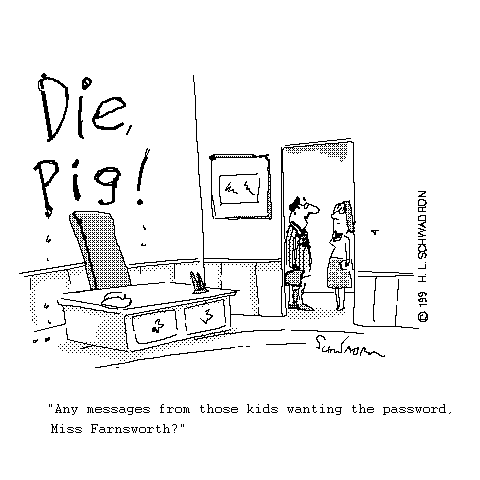WHAT IF I DON'T KNOW THE PASSWORD?
Before I launch into the password policy, let me interrupt and ask a simple question. Did you read the instructions? Over half of our password queries come from folks who clicked on the trick title but didn't notice that it was surrounded by a paragraph that gives explicit instructions on what Userid and Password to use. If you were one of these click-now-and-ask-questions-later types, go on back to the magazine and try again. You don't need this section -- yet. If you followed the instructions but are still unfamiliar with the password references to The Little Egypt Gazette, do not despair. It simply means that you are either (1) very young or (2) perhaps not so young, but at least new to magic. If so, I envy you on either count. You have many delights ahead of you. The least I owe you is a clear statement of this journal's password policy. Back in 1925, in his famous prospectus for the first issue of The New Yorker, editor Harold Ross promised that his magazine would adhere to the following: It will be human. Its general tone will be one of gaiety, wit and satire, but it will be more than a jester. It will not be what is commonly called radical or highbrow. It will be what is commonly called sophisticated, in that it will assume a reasonable degree of enlightenment on the part of its readers. It will hate bunk. When it is stated that this journal is for magicians only, I am invoking Mr. Ross's expectation of "a reasonable degree of enlightenment" on the reader's part. Although that expectation applies to the entire magazine, it particularly applies to the card trick section, where that enlightenment is tested via a password reference commonly known to all seasoned magicians. It's not about belonging to a magic club. It's about knowing something about magic. I do this for several reasons. First, this is a publicly available web site. If I were to make the card trick section equally available, then other magicians would accuse me, correctly, of exposure. As Harry Anderson might say, "The President of the Magic Club" would be knocking on my door. Second, by assuming a reasonable degree of enlightenment, I don't have to waste time in the trick section explaining well-known moves. If I refer to a Hindu shuffle or a Hermann pass or an Elmsley count, I expect you to know what I am talking about. If you don't know the easy password references, you probably won't know the technical references in the card trick. Third, the passwords enable me to prevent exposure at a slightly higher plateau. For example, in the February 1996 issue, I present a variation on Don Alan's Ranch Bird effect. Most seasoned magicians are familiar with this trick and its working. While it is cricket to publish significant enhancements to existing effects, which I believe this is, I would prefer to do so without tipping the method of the original to rank beginners. The password filter allows me to limit the dissemination of secrets to the uninitiated. Ah, but how to attain enlightenment? There are several possibilities. 1. You might be one of those rare inventive individuals, such as Slydini or Jerry Andrus, capable of creating wonderful new magic with methods all your own. If that is the case, then shun "enlightenment." It will only diminish your gifts. 2. You are a more mortal individual, like most of us, and therefore need education. I humbly endorse the following sources:
3. You are rich and lazy, and you don't want to put in the necessary work to attain enlightenment. You just want to know the damn password! The McDonald $100 Ace Routine, devised by a one-armed magician named "Mac" McDonald, owes its title to the last line of the routine: "And that's how cards are controlled without sleight of hand -- I'll show you the secret for a hundred dollars." In Dai Vernon's More Inner Secrets of Card Magic, Dai adds the footnote to this trick: "By the way, if anyone offers to pay, do the same as we have no doubt our good friend Mac would advise -- take the money!" So if you really really want to know the password, send me $100, and I'll email the passwords to you for as long as this magazine persists! A final warning: Magic is a wonderful hobby and/or vocation, so wonderful that it can easily become all-consuming. If you are young, learn to keep magic in perspective. Stick to your studies. Participate in sports. Have a girlfriend. The more of "real life" you have to bring to your magic, the better a magician you will be. Return to The Little Egypt Gazette. |